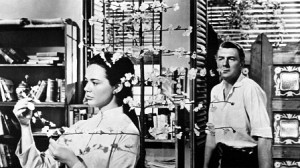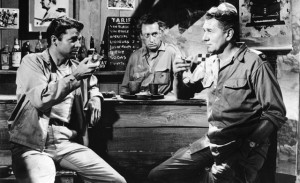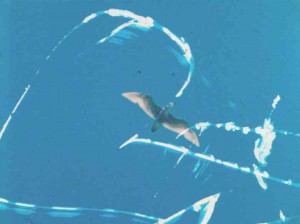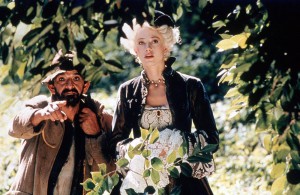From the Chicago Reader (February 1, 2002). — J.R.

Joseph L. Mankiewicz’s 1958 adaptation of the Graham Greene novel certainly makes hash of its anti-American, procommunist elements, but this story about a disillusioned British journalist (Michael Redgrave) and an idealistic American (Audie Murphy) battling over the heart, mind, and body of a Saigon woman was sufficiently provocative for Jean-Luc Godard to declare it the best film of the year. The fact that Mankiewicz cast Italian actress Giorgia Moll as the woman suggests how remote he was from Vietnam, yet the scene in which the American asks the Brit to translate his marriage proposal into Vietnamese must have struck Godard: five years later he cast Moll as an interpreter in Contempt. Though The Quiet American may seem a curious cold war artifact today, it embodies Mankiewicz’s talky cinema in all its measured ambiguity. 120 min. (JR)
 Read more
Read more

My exposure to Stan Brakhage’s massive oeuvre has been somewhat limited, but these four works made in 1998 are among the most exciting and ravishing I’ve seen, rivaling even Scenes From Under Childhood (1970). Aptly described by J. Hoberman of the Village Voice as “scratch-and-stain films,” these mainly nonphotographic works “are, among other things, a visual analogue to abstract expressionism.” Reel 1 (22 min.) registers as visual music in its development of motifs and its use of rests to divide the work into discrete sections–a music that pulses, throbs, and sometimes winks on and off like a strobe light. Reel 2 (15 min.) credits Sam Bush as the “visual musician” and Brakhage as the “composer”; more staccato, dramatic, and richly orchestrated than the first reel, it occasionally recalls early Stravinsky in its fierce rhythms. Reels 3 (15 min.) and 4 (20 min.) are my favorites: the former uses bursts of photography (water, sky, birds, forest, sand, a nude child, merry-go-round horses), and the latter often suggests animation, with a black field disrupted by tantalizing bursts and smears of color. Also on the program are two Brakhage works I haven’t seen — Coupling (1999, 5 min.) and Night Mulch & Very (2001, 7 min.). Read more
From the Chicago Reader (April 15, 2002). — J.R.

Clare Peploe’s mainly traditional adaptation of Pierre Marivaux’s 18th-century gender-bending romantic comedy has many of the virtues one would expect from the woman who made the highly entertaining High Season and Rough Magic. But despite the wonderful conclusion, when the film turns into a musical performed before a live audience, as well as the pleasures of the cast and the screenplay — which Peploe, working from an English translation by Martin Crimp, wrote in collaboration with her husband, Bernardo Bertolucci, who’s the movie’s producer, and screenwriter Marilyn Goldin — I was periodically put off by a certain self-consciousness of delivery. Mira Sorvino stars as a princess who, along with her lady-in-waiting (Rachael Stirling), dresses in drag in order to get close enough to the crown’s true heir (Jay Rodan) to offer him the throne that is rightfully his. Others in the cast include Ben Kingsley and Fiona Shaw. PG-13, 107 min. (JR)
 Read more
Read more





